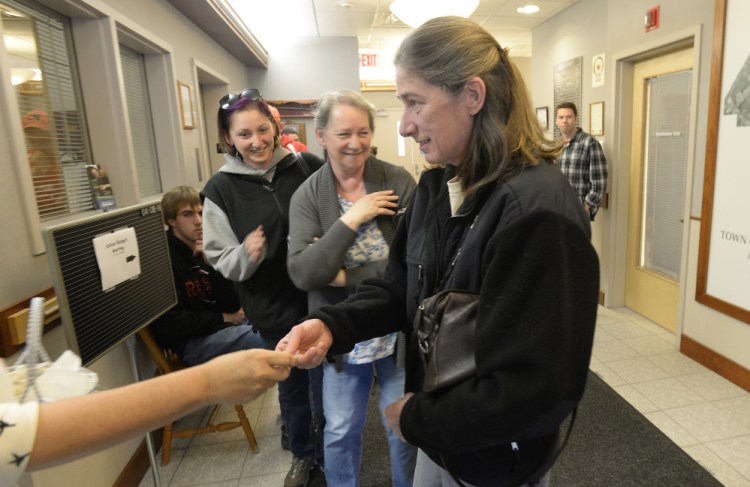 SCARBOROUGH — The town clerk’s office closed Tuesday and Steve Snow hadn’t shown.
SCARBOROUGH — The town clerk’s office closed Tuesday and Steve Snow hadn’t shown.
One of 30 residents with a commercial shellfish license, Snow had started working as a merchant mariner and had plans to move to Florida, people had heard.
So when his license came up for its annual renewal this week and he let it lapse, numerous people in Scarborough saw an opportunity to change their lives.
There’s no limit to how long town residents can hold onto their shellfish licenses, and many who are lucky enough to land them keep them for the rest of their lives, or at least as long as they can do the work.
About half of the license holders dig clams full time, some as often as seven days a week, said Robert Willette, chairman of the town’s Shellfish Conservation Commission and one of the lucky license holders.
Others, like him, cobble together a living between clamming and other jobs. Willette does carpentry and works on cars, on top of spending five days a week on the flats.
The hours of the profession depend on the tides. It’s feasible to dig from about three hours before low tide to three hours after, Willette said. The time of day when that occurs can affect how many clams diggers can collect, since they’re restricted to digging between half an hour before sunrise and half an hour after sunset, he said.

A small crowd gathered at Scarborough’s town hall for the drawing for a commercial shellfish license. David Green, left, who already had a license, said there’s enough competition on the flats and he hoped his sister-in-law would win the license Friday because he didn’t think she’d use it. Shawn Patrick Ouellette/Staff Photographer
Willette said that even for those who dig clams every day, their annual income would fall far short of six figures.
Tody Justice, the town clerk of more than 20 years, remembers lotteries for shellfish licenses when people lined up out the door. She doesn’t remember a time when Snow wasn’t one of the people who held one.
Although two came up for grabs last year, it’s unusual for a commercial license to become available two years in a row, and it’s usually much longer between lotteries, Justice said.
On Friday afternoon, 13 Scarborough residents showed up at the clerk’s office for a chance at the single license, although about 40 people were there altogether, including children and teenagers vying for the two student licenses that had become available.
Nolan Orff, 12, wanted to be able to go out with his older brother, who already has a student license, and make some money to start saving for college.
Their father, Chris Orff, a Portland firefighter, applied for the commercial license so he could go with them.
They weren’t the only applicants who were related. Twenty-something siblings Sarah and Casey Violette, whose father is a commercial fisherman, were both hoping for the opportunity to have a bigger hand in the family business.
Then there was 55-year-old Nancy Rodoalph, whose job making pizza and sandwiches at a local convenience store doesn’t bring in enough income. She moved from Cape Cod, where she cleaned houses, to her sister and brother-in-law’s house in Scarborough a couple of years ago, hoping there would be more work opportunities.
Her brother-in-law, David Green, has a commercial shellfish license and said there’s already enough competition on the flats. He was hoping Rodoalph would win the license because he didn’t think she’d end up using it.
After checking into the clerk’s office, each applicant watched a small strip of paper with their name printed on it get placed in a basket with others of the exact same size, folded in the same way.
Justice has been accused of fixing the lottery before, so she makes sure that everything is precise – and she doesn’t pick the winner.
That job has been taken over by Colette Mathieson, the town manager’s executive assistant.
The applicants, along with their friends and family members, were lined up along a wall in the Scarborough Municipal Building when Justice came out of the clerk’s office with the basket in her hand and Mathieson by her side.
“Drum roll,” Mathieson said before reaching into the basket and selecting a paper strip.
It was Rodoalph. Her niece Jessica Holbrook laughed.
Green had gotten his wish.
Send questions/comments to the editors.



